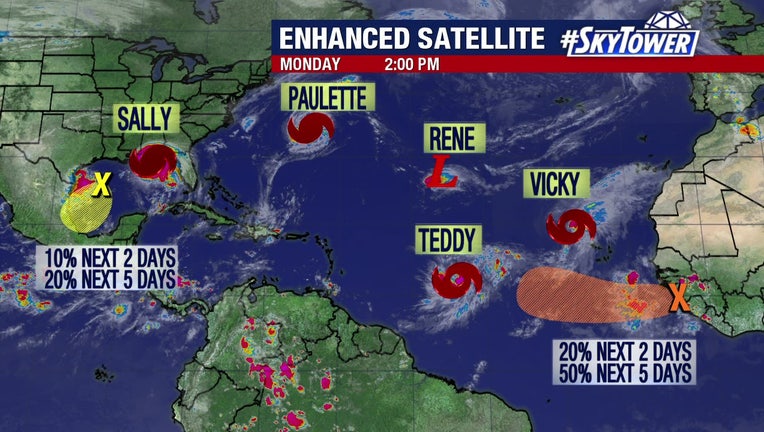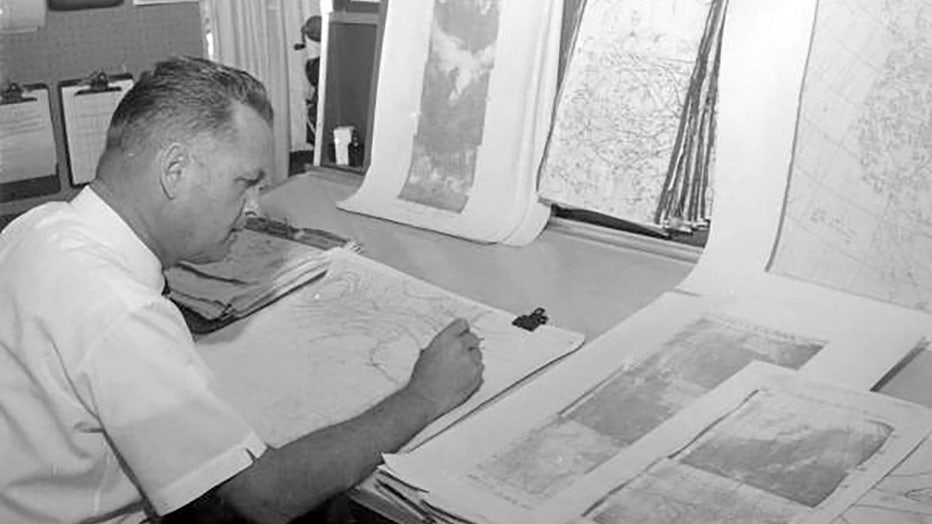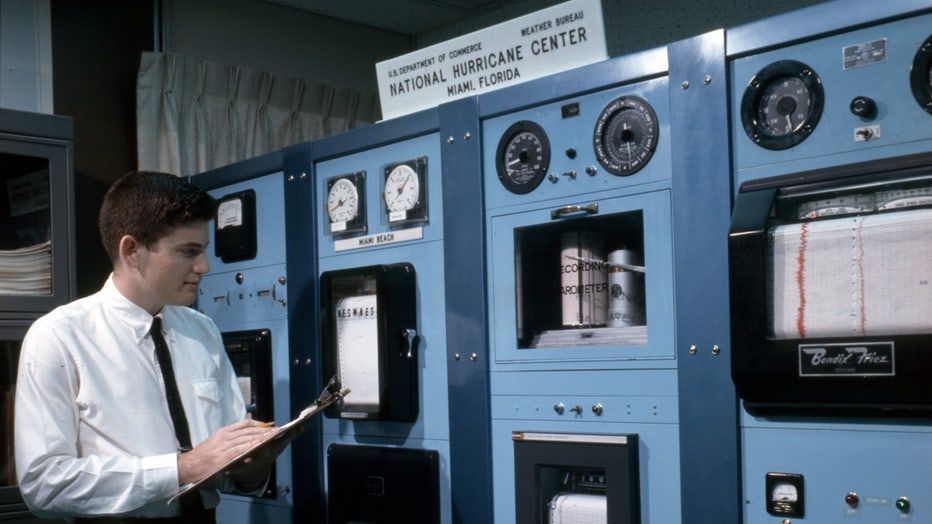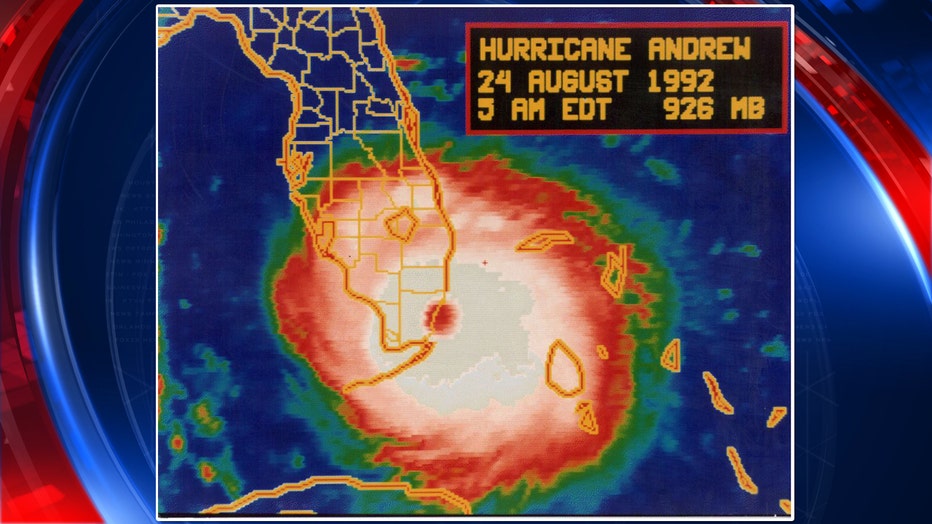What happens if we run out of hurricane names?

TAMPA, Fla. - For the first time since 1971, there are five named storms in the Atlantic hurricane basin at the same time: Sally in the Gulf of Mexico, plus Paulette, Rene, Teddy, and Vicky spread across the ocean.
As expected, 2020 has been a very busy season; 15 names have already been use, and Vicky’s formation this morning leaves only one more name on the 21-name list for the year: Wilfred.
So what happens if we have more than one additional named storm? Better brush up on your Greek.

An unidentified man works with charts at the U.S. Weather Bureau in Miami, date uncertain. (Dept. of Commerce collection via Florida Memory)
First, some background. Initially, military meteorologists used a haphazard system involving the phonetic alphabet to name storms – giving us hurricanes Baker, Dog, and Easy in 1950, for example.
The United States Weather Bureau began creating the more familiar lists of storm names in 1953. They were all women’s names at first, but that changed in 1978 at the direction of then-Secretary of Commerce Juanita Kreps.

A meteorologist viewing instruments at the U.S. Department of Commerce Weather Bureau National Hurricane Center in Miami, circa 1970. (Dept. of Commerce collection via Florida Memory)
The 21-name lists – one for each letter of the alphabet, minus the less-common letters Q, U, X, Y, and Z – are now maintained and updated by an international committee of the World Meteorological Organization.
Six lists are used in rotation and recycled every six years, meaning the 2020 list will be used again in 2026. A name is retired only if a storm is so deadly or costly that the future use of its name on a different storm would be inappropriate and insensitive.
LINK: See the rotating lists of names

Satellite view of Hurricane Andrew, 1992.
When all 21 names are used up in a season, the Greek alphabet is used. That means ‘Alpha’ will be on deck if and when Tropical Storm Wilfred forms.
The Greek alphabet has been used only once, in 2005 – the year that gave us hurricanes Katrina, Rita, and Wilma. The names Alpha, Beta, Gamma, Delta, Epsilon, and Zeta were all used that year.

Greek alphabet (full list):
- Alpha
- Beta
- Gamma
- Delta
- Epsilon
- Zeta
- Eta
- Theta
- Iota
- Kappa
- Lambda
- Mu
- Nu
- Xi
- Omicron
- Pi
- Rho
- Sigma
- Tau
- Upsilon
- Phi
- Chi
- Psi
- Omega
Retired Atlantic hurricane names and the last year they were used (full list):
- Agnes, 1972
- Alicia, 1983
- Allen, 1980
- Allison, 2001
- Andrew, 1992
- Anita, 1977
- Audrey, 1957
- Betsy, 1965
- Beulah, 1967
- Bob, 1991
- Camille, 1969
- Carla, 1961
- Carmen, 1974
- Caro, 1954
- Celia, 1970
- Cesar, 1996
- Charley, 2004
- Cleo, 1964
- Connie, 1955
- David, 1979
- Dean, 2007
- Dennis, 2005
- Diana, 1990
- Diane, 1955
- Donna, 1960
- Dora, 1964
- Edna, 1954
- Elena, 1985
- Eloise, 1975
- Erika, 2015
- Fabian, 2003
- Felix, 2007
- Fifi, 1974
- Flora, 1963
- Florence, 2018
- Floyd, 1999
- Fran, 1996
- Frances, 2004
- Frederic, 1979
- Georges, 1998
- Gilbert, 1988
- Gloria, 1985
- Greta, 1978
- Gustav, 2008
- Harvey, 2017
- Hattie, 1961
- Hazel, 1954
- Hilda, 1964
- Hortense, 1996
- Hugo, 1989
- Igor, 2010
- Ike, 2008
- Inez, 1966
- Ingrid, 2013
- Ione, 1955
- Irene, 2011
- Iris, 2001
- Irma, 2017
- Isabel, 2003
- Isidore, 2002
- Ivan, 2004
- Janet, 1955
- Jeanne, 2004
- Joan, 1988
- Joaquin, 2015
- Juan, 2003
- Katrina, 2005
- Keith, 2000
- Klaus, 1990
- Lenny, 1999
- Lili, 2002
- Luis, 1995
- Maria, 2017
- Marilyn, 1995
- Matthew, 2016
- Michael, 2018
- Michelle, 2001
- Mitch, 1998
- Nate, 2017
- Noel, 2007
- Opal, 1995
- Otto, 2016
- Paloma, 2008
- Rita, 2005
- Roxanne, 1995
- Sandy, 2012
- Stan, 2005
- Tomas, 2010
- Wilma, 2005

